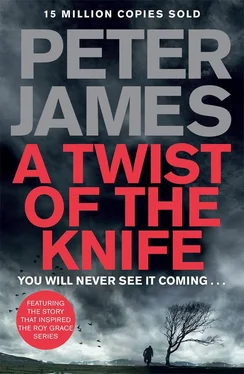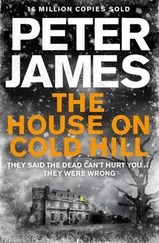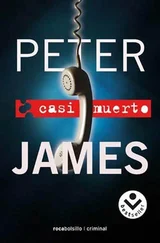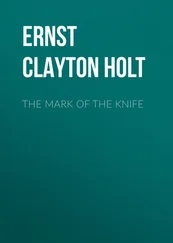And his demands for greatness and excellence became ever higher.
Almost uniquely among restaurant critics, N.N. Kettering employed no assistants. He ate lunch and dinner out seven days and nights a week. Sometimes breakfast, too. Food was his life. He had never married, never even had a girlfriend — or boyfriend. And he always paid for every meal in crisp, new banknotes. He never accepted anything free.
He never tipped.
He felt fulfilled. As if he had been put on this planet to be the custodian of its restaurants’ standards. He was married to tomorrow’s restaurants. His reviews were his babies.
Once, early in his career, in a rare interview, he declared, ‘The best number for dinner is two — myself and a good waiter.’
But not on the thirteenth of any month.
On the thirteenth of any month, it all changed.
From as far back in his life as he could remember, N.N. Kettering had been a triskaidekaphobic. He had a morbid fear of the number thirteen. And the worst possible date was a Friday the thirteenth. Because not only was he a triskaidekaphobe, he was also a paraskavedekatriaphobe.
Someone who has a total fear of the date Friday the thirteenth.
He knew that the number thirteen was out to get him. It was around him all the time. It was there on car number plates. It lurked in the number of grains in the breakfast cereals he ate. In the number of berries he added to his cereal. In the number of mouthfuls he took to eat his breakfast, and his lunch, and his dinner. In the number of steps he would take from a taxi to the restaurant. In the number of steps from the front door of the restaurant to his table.
He would never sit at table thirteen. He would never choose the thirteenth item on a menu. Nor on a wine list. Nor anything that was a multiple of thirteen.
Whenever it was a Friday the thirteenth, he would prepare himself in advance. All kinds of danger lurked out in the world. So it was best not to risk it. Stay home. But home was dangerous, too. He had read that the place where you were most likely to die was in your own home, especially your kitchen. So, on every Friday the thirteenth he stayed in bed, in his small flat in London’s Notting Hill. The night before, he prepared everything he would need up until midnight the following day. He would spend the time reading, and watching television — mostly food programmes — and visiting, anonymously of course, a number of networking sites and online discussion groups about restaurants.
So it happened, on one such Friday the thirteenth, a cold February day when he was logged on while in bed, that he found by chance a new discussion group on the Web, made up of some of the world’s greatest chefs. He had eaten in every one of their restaurants — a few of them he had praised, but the majority he had trashed. He watched the discussion in fascination, as they were talking about a restaurant he had never heard of. And not just talking about it. Raving about it.
This demented him! He knew every significant restaurant in the world, surely? He had eaten at all the ones that had any kind of a reputation. Yet here, suddenly, was a reference not just to a restaurant, but to one these particular chefs agreed unanimously was the very best in the world. No restaurant sourced better cuts of meat. No restaurant handled an entire range of offal with such inventiveness. He became hungry just reading the descriptions of the sauces, the tenderness of every bite, the juxtaposition of flavours. He was salivating.
And the bastards did not give away the name.
Frustrated, he posted, under his Internet pseudonym, ChefStalker , the words: ‘Hi everyone, what’s the name of this place? I thought I knew every restaurant worth eating in on the planet!’
To his dismay, the discussion ended abruptly, without any reply.
He realized there was only one thing for it. He would email some of the chefs, selecting only the ones he had praised, revealing who he was, knowing that was almost bound to lead to an invitation.
To his joy, he was right. Two days later he received an email, although, curiously, anonymous:
Dear N.N. Kettering,
Thank you for your interest. This establishment about which you are enquiring is in fact a private dining club. We would be delighted for you to join us as our guest the next time we hold one of our dinners — Friday 13 May. There is one condition: that you never write about this club, either before or after your visit. Some things are just too good to be shared. You will receive your formal invitation, and the address, on the night of 12 May. We look forward to greeting you. Bon appétit!
He stared at the email. Friday 13 May.
He had never in his life, since leaving school, left the safety of his home on a Friday the thirteenth.
His first inclination was to reply, explaining that he was grateful for the invitation, but that he could not accept.
But then he thought again about all the words of praise he had read. Many of them from chefs who, he might have thought, had experienced every taste sensation there was to taste, but who raved unanimously.
God, how he loved the mystique of restaurants. He remembered so vividly the first restaurant he had ever entered, when he was just ten years old; it was called Verry’s. He was with his parents, in busy, noisy Regent Street in London. The door had swung shut behind them, and they were in a new world, dimly lit, oak-panelled, with a quiet hum of chatter, tantalizing smells of garlic and grilling meat and fish. A man in a tuxedo, with an Italian accent, had greeted his parents as if they were his long-lost friends, then had shaken his hand and led them courteously along a line of red leather banquettes to their table.
Crystal chandeliers hung from the ceiling. Crystal glasses were laid out on a crisp, white tablecloth. A silver dish lay on it, filled with frilly curls of butter. Another silver dish appeared, stacked with Melba toast. Then he was presented with a burgundy leather-covered menu, filled with delights. A few minutes later, a green leather-bound wine list, as thick as a bible, was placed in his father’s hand.
Waiters swept past with silver trays laden with food. Others hovered around their table. It was like being on a new planet, in a new universe. From that moment onwards, Nigel Norbert Kettering knew that he wanted to spend his life in this world. But, even at ten, he noticed things that were not right. Little imperfections. The waiter forgot a side order of haricot verts, and had to be reminded twice. His father muttered that his steak was cooked more than he had asked, but seemed too in awe of the waiters to complain. So, to his father’s embarrassment and his mother’s astonishment, little Nigel stuck up his arm and summoned the waiter. Five minutes later the offending steak was duly replaced.
That was his start. And now, aged forty-four, he had succeeded beyond all his dreams. And there were still some restaurants he entered that held that same, magical promise of Verry’s all those years ago.
And now there was one that sounded as if it would top them all. But his invitation was for a Friday the thirteenth. He emailed back, asking what other date options there were. Within minutes he received a reply: ‘None. We assume you are declining. Thank you.’
Almost as fast as his fingers could move, panic causing beads of sweat to appear all over that brow of his, he typed back: ‘No, not declining. Thank you. I’m accepting.’
The next three months passed slowly, feeling more like three years. Everything in every restaurant irritated him. Gormless, moronic waiters sanctimoniously reciting the day’s specials as if they had personally line-caught or wood-roasted the damned fish or meat with their bare hands. Eating starters of bi-valves tortured to death in unpleasantly flavoured oils, or pasta resembling origami creations made during handiwork classes at special needs institutions.
Читать дальше












